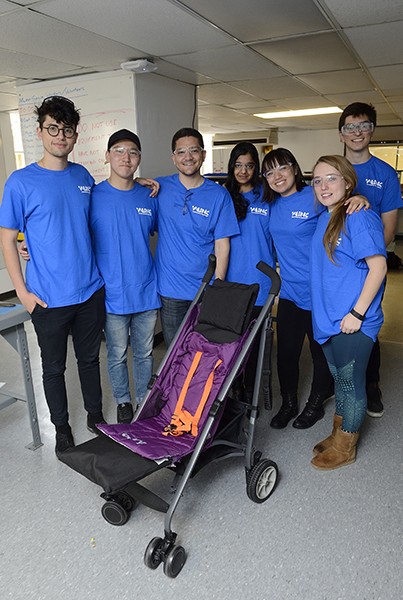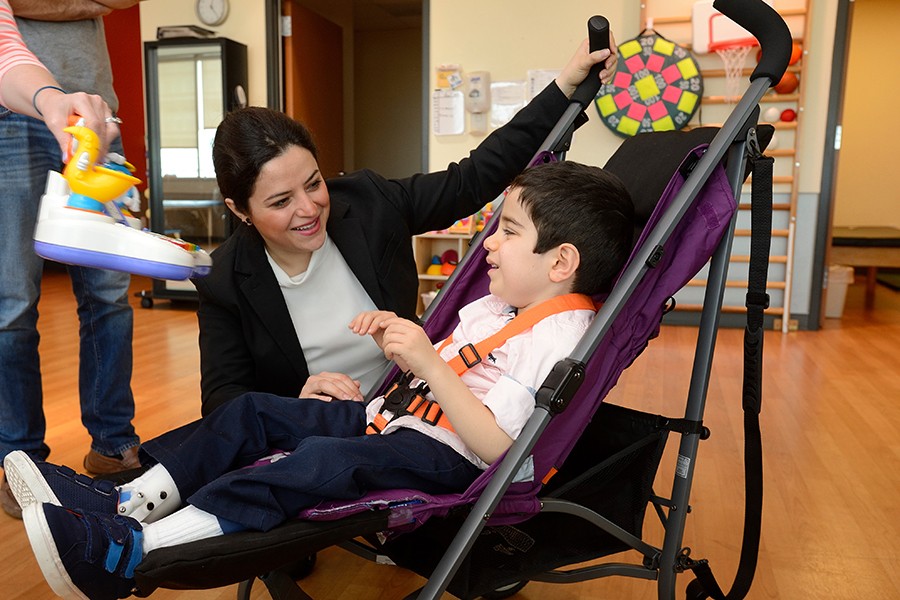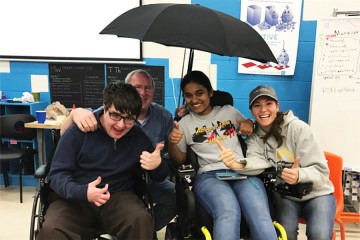Thanks to a team of student engineers at Johns Hopkins University, 6-year-old Karam Tarazi and his mother, Dana Ajilikin, are spending warm afternoons among the tulips at Baltimore City's Sherwood Gardens and enjoying the April sunshine at Angel Park in Perry Hall.
To embark on such outings, Ajilikin, 32, just lifts her son, who suffers from a rare progressive genetic disease, into the new customized stroller designed and built by the budding engineers, and off they go.
Excursions like this were far more difficult before Karam's revamped vehicle was unveiled.
"The new stroller is just wonderful," Ajilikin said. "It is very lightweight, so I can get it in and out of the car easily, and it is very comfortable for Karam—much better than his heavy wheelchair, which was almost impossible for me to manage alone."
Karam's condition has damaged his nervous system, resulting in a lack of muscle control, spasticity, and other physical symptoms. The dark haired, big-eyed little boy cannot walk or talk.
More than a year ago, his parents brought him to Baltimore from Syria, where he was born, for treatment, and the family settled in the area. At a health expo last fall, Ajilikin and her husband, Ousama Tarazi, met Angela Tyler of V-LINC, a Baltimore nonprofit that matches people who have special challenges caused by disease or disability with volunteers who can design and build custom solutions for them.
"Dana told me right away about the difficulty of managing Karam in his heavy wheelchair when she had to take him out alone, and how what they needed was a lightweight stroller that was big enough and sturdy enough for their boy," said Tyler, a volunteer services manager at V-LINC.
Tyler reached out to Niel Leon, a Johns Hopkins senior staff engineer and V-LINC volunteer who set up the project for the student chapter of the American Society of Mechanical Engineers at Johns Hopkins University's Whiting School of Engineering.
"A commercially available stroller that would meet Karam's needs would cost more than $1,600," Leon said. "I knew the students were up to the challenge of creating what the family needed for much less."
Working through V-LINC's "What-I-Wish" program, the students had access to $500 for the parts and supplies they needed to create the custom stroller. Those costs are paid for by V-LINC donors.
Led by Sina Fahimi Hanzaei, a junior mechanical engineering major, the eight-member student team set to work immediately, meeting with and observing Karam and interviewing both his parents and Brittany Hornby, the boy's physical therapist at the Kennedy Krieger Institute.

Image caption: An eight-member team of engineering students built a stroller that weighs less than 15 pounds.
Image credit: Will Kirk / Johns Hopkins University
"Our goal was to design a stroller that would support Karam's body and frame and hold him in a secure and comfortable position, while also being lightweight enough and foldable, so his mother could manage it on her own," Fahimi Hanzaei said.
In fact, it was the opportunity to apply his mechanical engineering skills to a project that would benefit a child with a disability and his family that spurred Fahimi Hanzaei to join the student team.
"This whole area—using engineering to make people's lives better—is something I care deeply about," said Fahimi Hanzaei, who is from Iran. "I have family members, people very close to me, who are affected by disability. So this project hits me close to home."
After extensive research, the students purchased an off-the-shelf, heavy-duty umbrella stroller designed to carry children up to 55 pounds, then modified it in several ways. First they extended the head, back, and leg rests to accommodate the child's long, slender build, and to allow for at least two more years of growth. Next they replaced the original small back wheels with larger lawn mower wheels from a nearby home-improvement store.
"The big challenge was that the brakes had to be on the back wheels for safety, so we took the brakes out of the old wheels and installed them in the new, larger wheels," Fahimi Hanzaei said. "It was a complicated situation to actually mount those larger wheels on the frame with the brake system, but fortunately, we got help from people in the Whiting School's manufacturing department."
The resulting stroller weighs less than 15 pounds, supports the child's unstable torso, and, best of all, folds up easily. Fahimi Hanzaei and Leon presented it to Karam's parents on the child's sixth birthday a few weeks ago.
"This is the best birthday present of all," said Ajilikin as she pushed her son across the shiny wooden floor in the bright, spacious Kennedy Krieger Institute physical and occupational therapy room where the family met the Johns Hopkins team for the hand-off.
"The students and staff were excellent to work with," she added. "We are so grateful. Having the stroller like this is going to make such a big difference to Karam and to us."
Looking on, Tyler said, "This never gets old. Never."
Tagged mechanical engineering










